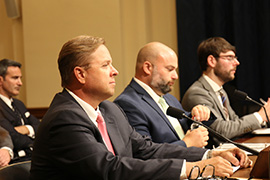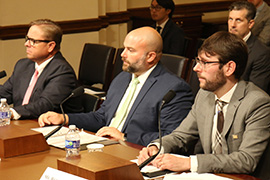- Slug: BC-CNS-Border Costs,640 words.
- 2 photos, video story available (thumbnails, captions below).
By Adrienne Washington
Cronkite News
WASHINGTON – Yuma County cannot continue to bear the cost of caring for immigrants that are flooding across the border without help from the federal government, a county official testified Wednesday.
County Supervisor Jonathan Lines told the House Homeland Security Committee that local communities are willing to help migrants but should not have to shoulder the entire cost of health care, food, shelter and more.
Lines pointed to the Yuma Regional Medical Center, which he said racked up nearly $26 million in uncompensated expenses last year from caring for migrants.
“If we continue the way we are going right now, it’s not sustainable,” Lines said in an interview after the hearing.
“We have received lots of outside help from NGOs (nongovernmental organizations) and from churches assisting,” he said. “Yet the federal administration and the federal government hasn’t done anything to sustain border communities.”
It was at least the third House hearing this year – including one was held in Yuma – where officials from Arizona border communities have complained about the costs they have had to bear as migration surges along the southwestern border.
Customs and Border Protection said it encountered more than 1.9 million migrants along the southern border through July – or the first 10 months of fiscal 2023. CBP said 161,534 crossed in the Yuma sector of the border during that time and 273,876 were encountered in the Tucson sector.
For Republicans at the hearing – which was titled “The Financial Costs of Mayorkas’ Open Border” – the source of the problem was obvious: President Joe Biden’s administration and Department of Homeland Security Secretary Alejandro Mayorkas.
“This administration created this southern border circus,” said Rep. Dale Strong, R-Ala. “Illegal aliens throughout America are destroying economies, school systems, hospitals, law enforcement, first responders, court systems and jails.”
Another common Republican refrain, unrelated to the costs that border communities face, was the threat of fentanyl and human trafficking.
While most Democrats at the hearing agreed that local communities could use help, they also pointed to the positive contributions migrants make to the U.S. economy and accused the GOP of demonizing migrants as a political ploy.
They also pointed out that Wednesday’s hearing was just the latest in a string of hearings in the GOP-led House with a variation on the title “open borders” and a criticism of the administration.
Rep. Dan Goldman, D-N.Y., said Republicans are “not interested in fixing the problem.”
“They’re interested in starving our border, starving our homeland security, so that it continues to fail for their political benefit,” Goldman said.
While no administration officials were invited by the Republican majority to testify, witnesses included New York City Council member Joe Borelli whose city is facing the same problems as Yuma as it grapples with an influx of migrants.
Unlike Yuma, however, many of the migrants in New York have been bused there by governors of southern states – including Arizona, Texas and Florida. More than 100,000 have arrived in New York City since last year, according to published reports.
“Right now, almost every community in our city is on edge, fearing that the next migrant shelter will be in their backyard,” Borelli testified. “Worrying about how this growing crisis will affect every aspect of life in New York.”
Besides the out-of-pocket cost to local agencies, Lines said, the demand for services that migrants place on the system stresses the ability to serve local residents. He pointed to the hospital and to law enforcement as examples, noting that some migrants will call 911 when they are in distress.
Despite the partisan bickering at the hearing, Lines said there is still room for a bipartisan remedy.
“In the community of Yuma, we have Republicans and Democrats that have come together to solve the problem,” Lines said. “I think it can be a model.”
For more stories from Cronkite News, visit cronkitenews.azpbs.org.
^__=
Web links:
_ Committee hearing: https://homeland.house.gov/hearing/full-committee-hearing-entitled-the-financial-costs-of-mayorkas-open-border/
_ Border encounters: https://www.cbp.gov/newsroom/stats/southwest-land-border-encounters-by-component
_ Previous hearings: https://cronkitenews.azpbs.org/2023/02/28/pinal-yuma-officials-tell-house-migration-surge-is-overwhelming-them/
^__=
Yuma County Supervisor Jonathan Lines, left, told a Senate panel that the current spending by local governments on caring for migrants is “not sustainable.” Also testifying were New York City Council member Joe Borelli and American Immigration Council policy director Aaron Reichlin-Melnick, right. (Photo by Adrienne Washington/Cronkite News)
From left, Yuma County Supervisor Jonathan Lines, New York City Council member Joe Borelli and American Immigration Council policy director Aaron Reichlin-Melnick testified on the impact immigration is having on local governments’ services. (Photo by Adrienne Washington/Cronkite News)

